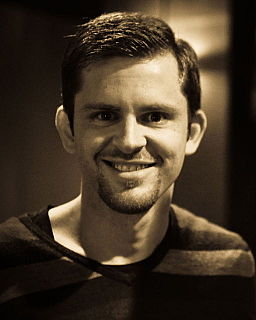Цитата Шери Хубер
Страх заставляет нас тратить свою жизнь на борьбу с ним, якобы для того, чтобы преодолеть его. Но это уловка. Только страх (иллюзия разделения) хотел бы, чтобы мы работали, чтобы не бояться, именно потому, что отдельное я не может не бояться!
Связанные цитаты
Я думаю, что Бхагавад-гита рассказывает как о силах света, так и о силах тьмы, которые существуют внутри нас самих, в нашей собственной душе; что наша глубочайшая природа — двусмысленность. У нас там есть эволюционные силы - силы творчества, и любви, и сострадания, и понимания. Но и у нас внутри есть тьма - дьявольские силы разделения, страха и заблуждения. И в большинстве наших жизней внутри нас происходит битва.
Страх настолько фундаментален для человеческого существования, что все великие духовные традиции возникли в попытке преодолеть его влияние на нашу жизнь. Все они разными словами провозглашают одно и то же основное послание: «Не бойся». Хотя традиции сильно различаются по способам, которыми они предлагают вывести нас из страха, все они питают одну и ту же надежду: мы можем избежать паралича страха и войти в состояние благодати, когда встречи с инаковостью не будут угрожать нам, но обогатят нашу работу и нашу жизнь. .
Обычный страх защищает нас; ненормальный страх парализует нас. Обычный страх побуждает нас улучшать свое личное и коллективное благополучие; ненормальный страх постоянно отравляет и искажает нашу внутреннюю жизнь. Наша задача не в том, чтобы избавиться от страха, а в том, чтобы обуздать его и овладеть им.
В Библии чаще всего повторяется заповедь «Не бойся». Это там более двухсот раз. Это означает несколько вещей, если подумать. Это означает, что мы будем бояться, и это означает, что мы не должны позволять страху управлять нами. Прежде чем я понял, что мы должны бороться со страхом, я думал о страхе как о тонком внушении нашего подсознания, предназначенном для того, чтобы обезопасить нас или, что более важно, уберечь нас от унижения. И я думаю, что это служит этой цели. Но страх — это не только средство обеспечения нашей безопасности; это также манипулятивная эмоция, которая может заставить нас жить скучной жизнью.
Страх это хорошо. Как и неуверенность в себе, страх является индикатором. Страх говорит нам, что мы должны делать. Помните наше эмпирическое правило: чем больше мы боимся работы или призвания, тем больше мы можем быть уверены, что должны это делать. Сопротивление переживается как страх; степень страха приравнивается к силе Сопротивления. Следовательно, чем больше мы боимся того или иного предприятия, тем больше мы можем быть уверены в том, что это предприятие важно для нас и для роста нашей души. Вот почему мы чувствуем такое сильное Сопротивление. Если бы для нас это ничего не значило, Сопротивления не было бы.
Мы боимся прошлого, настоящего и будущего. Мы боимся неизвестного, мы боимся не иметь достаточного, потерять то, что имеем, не иметь того, что хотим. Мы боимся того, что станет с нами и теми, о ком мы заботимся. Мы боимся того, что другие думают о нас и что они не думают о нас. Мы боимся, боимся, боимся, и поэтому нами можно управлять, манипулируя всем, чего мы боимся. Нынешняя война с террором — это война страха. Нет страха, нет контроля.
Страх удерживает нас в прошлом. Страх неизвестности, страх быть покинутым, страх быть отвергнутым, страх нехватки, страх быть недостаточной, страх будущего — все эти и другие страхи держат нас в ловушке, повторяя одни и те же старые модели поведения и делая один и тот же выбор. и снова. Страх мешает нам выйти за пределы комфорта или даже привычного дискомфорта того, что мы знаем. Почти невозможно достичь наивысшего видения своей жизни, пока нами руководят наши страхи.
Страх — нормальная человеческая эмоция. Сам по себе он не убийца. Мы можем научиться осознавать, когда нас охватывает страх, и можем научиться действовать сквозь страх и вопреки ему. Если, с другой стороны, мы не понимаем, что страх — это нормально, и его нужно контролировать и преодолевать, он парализует нас и остановит нас на пути. Мы больше не будем мыслить ясно или анализировать рационально. Мы готовимся к этому и контролируем это; мы никогда не позволяем ему контролировать нас. Это если делает, мы не можем вести.
Этот страх не имеет аналогии ни с одним страхом, который я знал раньше. Это самая низменная из всех возможных эмоций, чувство, которое было с нами до того, как мы существовали, до того, как существовало это здание, до того, как существовала земля. Это страх, который заставляет рыбу выползать на сушу и развивать легкие, страх, который учит нас бежать, страх, который заставляет нас хоронить наших мертвецов.
Многие из нас живут из-за страха перед тем, что о нас подумают другие люди. Мы ждем, пока кто-нибудь даст нам разрешение, в котором будет сказано, что быть собой — это нормально. Не пытайтесь быть бесстрашным и не притворяйтесь, что на вас не действует страх. Просто постарайтесь не дать страху принимать решения за вас.
Так же, как дети шаг за шагом должны отделиться от своих родителей, мы должны будем отделиться от них. И мы, вероятно, будем страдать... от некоторой степени тревоги разлуки: ведь разлука заканчивается сладким симбиозом. Потому что разделение уменьшает нашу власть и контроль. Потому что разлука заставляет нас чувствовать себя менее нужными, менее важными. И потому что разлука подвергает наших детей опасности.
Единственная жизнь, достойная жизни, — это жизнь, полная приключений. Доминирующей характеристикой такой жизни является то, что она не боится. Если не боится того, что думают другие люди. . . Он не адаптирует ни свой темп, ни свои цели к темпам и задачам своих соседей. Он думает своими мыслями, читает свои книги, у него есть собственные увлечения, и им руководит собственная совесть. Стадо может пастись, где ему вздумается, или метаться в панике, где ему вздумается, но тот, кто живет полной приключений жизнью, не будет бояться, когда окажется в одиночестве.








































